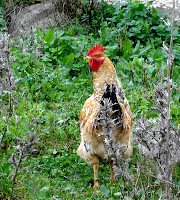Ponme unos huevos, por favor
 There must be a hundred cockerels in this town. Early one morning I counted thirteen different cockadoodledoos, each one more distant than the last, as they sounded their unique territorial reveilles. So there should be at least five hundred hens, scratching about in the huertos (little produce-gardens tucked in between buildings), or living on roof terraces, or even along the roadside.
There must be a hundred cockerels in this town. Early one morning I counted thirteen different cockadoodledoos, each one more distant than the last, as they sounded their unique territorial reveilles. So there should be at least five hundred hens, scratching about in the huertos (little produce-gardens tucked in between buildings), or living on roof terraces, or even along the roadside. Other domestic fowl reside here too; we are occasionally held up while driving out of town by a half-dozen stately geese ambling across the road. One house on the other side of town has turkeys roosting in the orange trees, and there are some strange-looking fat grey birds which may or may not be guinea-fowl, down near the waterworks.
But when I popped out to get some eggs this morning, the first three shops I went in had none. I was offered several excuses:
- The weather has been bad lately, they haven't been laying.
- Everybody is doing extra baking for the holidays.
- There wasn't a delivery today, because yesterday was a public holiday.
The third shopkeeper, however, offered me a solution. If I would just hold on a momentito ... She disappeared out the back and came back with half a dozen, all different shades and sizes, some with feathers still stuck to them. "I'm sorry they are only huevos de campo, they are a bit small, but they are nice and fresh", she explained. "And I've only got these six just now, but if you come back at the end of the week there should be some more."
Well, I was more than happy to get half a dozen new-laid free-range eggs for one euro. I wonder what Waitrose charges these days? How many shopkeepers in the UK would nip out the back and rummage under their own hens so I could have an omelette for lunch?
Eggy facts:
All eggs sold in Europe should be stamped with a code denoting their origin:
0-hens raised outdoors organically: huevos de campo - ecologico
1-hens raised outdoors: huevos de campo
2-barn-raised hens: huevos de granja
3-caged hens: huevos de jaula
In some of the little shops of Alcalá, you can get local huevos de campo that haven´t been through the packing and stamping process, like the ones I bought this morning. Often their shells are so hard you have to give it a fair old whack to break it! For this reason they are often given to you in plastic bags rather than trays.
To tell if an egg is fresh, put it in a bowl of cold water. If it floats to the top, chuck it. If it stays on the bottom, or just above the bottom, it's fine.
Be careful when asking a male shopkeeper if he has any eggs. ¿Tienes huevos? means "Have you got balls?" Better to say ¿Hay huevos?
Round here they use the verb ponerse a lot in shops - the reflexive form of poner, to put. ¿Que te pongo? means "What would you like?" But if you answer "Ponme unos huevos", they might burst out laughing. Poner has many other uses, including poner huevos - to lay eggs. I've never risked it; I stick to the book and use the verb dar, to give:
Dame una docena de huevos de campo, por favor. Give me a dozen free-range eggs, please.
I am English so I can't stop myself saying por favor, but of course this instantly marks me out as a foreigner. The Spanish rarely use it in this context.

Comments
But the point about the eggs still stands!